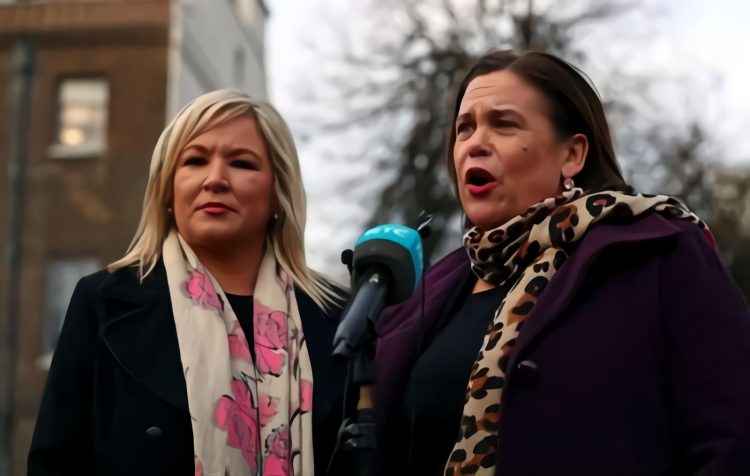After their historic victory, Sinn Fein leaders will push for an Irish unification referendum within the next five years. Westminster should promptly find solutions for issues in Northern Ireland to avoid political unrest in the region.
Nationalists Triumph over Pro-British Parties
The Republic of Ireland became independent from Britain a century ago, and the Protestant-majority politicians have led Northern Ireland. The unionist politicians have always led the Northern Ireland Assembly and identified themselves as British. However, the Catholic Sinn Fein won the most significant number of seats at Stormont and ended the pro-British dominance.
Sinn Fein’s victory will have a substantial impact on the politics of Northern Ireland and the whole UK. It is the first time that a nationalist MLA may become the first minister in Northern Ireland. Sinn Fein aims to unite Northern Ireland and the Republic of Ireland as it has earned a historic win. Sinn Fein has secured 29 percent of first-preference votes, while the Democratic Unionist Party (DUP) won 21.3 percent. This victory for a nationalist Northern Ireland party in the British-controlled region is a defining moment.
The Unionists Are Reluctant to Join Administration
Michelle O’Neil, the head of Sinn Fein in Northern Ireland, has mentioned their victory was a significant moment of change. She has said there should be a debate about Sinn Fein’s goal of uniting Northern Ireland with the Republic of Ireland. We should not forget that people have not voted for the unionist DUP, a leading advocate of Brexit. People did not vote due to the DUP’s role in post-Brexit talks between London and Brussels. Negotiators from London and Brussels had agreed on a protocol to arrange post-Brexit trades in Northern Ireland. A protocol that has created trade barriers between Northern Ireland and mainland Britain. It is worth mentioning that the DUP has asked Westminster to reform the Northern Ireland Protocol to scrap the created border in the Irish Sea. The largest pro-British party has said it would not join a power-sharing government unless the Protocol changes.
Northern Ireland Protocol Divided Political Parties
Brandon Lewis, the British government’s minister for Northern Ireland, has called on the parties to form an administration soon. The DUP has argued that Lewis cannot have both the Protocol and the administration. The party wants Westminster to act urgently and replace the trade arrangements. The Secretary of State for Northern Ireland has promised to address the issues around the Protocol.
The UK should reach an agreement with the EU to change the Northern Ireland Protocol. The prolonged negotiations on the Protocol have concerned businesses in Northern Ireland. The Protocol should have enabled a smooth trade function between the Republic of Ireland and Northern Ireland. However, under the Protocol, the transfer of goods between Northern Ireland and the rest of the UK is not smooth. There are checks and paperwork that have caused a delay in goods delivery from the UK to Northern Ireland.
Westminster Called NI Protocol a Problem
Britain and the EU had agreed on the Protocol during the Brexit negotiations to safeguard the 1998 Good Friday Agreement. Westminster did not want a hard border between Northern Ireland and the Republic of Ireland. However, the Protocol has created a border between Northern Ireland and mainland Britain. Consequently, Northern Ireland does not enjoy the same privileges inside the UK’s internal market as the other three nations do. Although the Protocol aims to avoid troubles in Northern Ireland, it has caused dissatisfaction among the pro-British unionists. The Northern Ireland nationalists have also wanted Westminster to address the problems with the Protocol. The Protocol has created additional bureaucracy and costs for businesses, so the flow of goods into Northern Ireland has decreased. The Protocol has remained a matter of contention in the UK. The government has admitted it has become a real problem.
Unsettled Problems Could Fuel Unrest in NI
Westminster politicians need to fix the issues related to the Protocol to ensure the country will form a power-sharing administration. There are concerns over the spark of sectarian violence if Westminster does not overcome the impasse soon. The UK Prime Minister Boris Johnson has emphasized the need for political leadership in Northern Ireland. Westminster should find solutions for the Protocol’s issues to ensure peace and political stability in Northern Ireland.
The UK government can trigger Article 16 of the Protocol and suspend some terms of the arrangements. Westminster should act carefully to avoid undermining the Good Friday peace agreement. London can prevent the threats if Westminster properly activates Article 16. It can change trade arrangements between Great Britain and Northern Ireland and settle things there. If the parties postpone paying the accounts, the remaining issues could fuel unrest in the region.
London Cannot Oppose a Unification Referendum.
During the election campaign, Sinn Fein had focused on economic concerns to win the middle-ground voters. O’Neill had said Sinn Fein did not set a date for a unification referendum at a television debate. She had added that the public wanted money in their pockets, and the party would first fight the cost of living crisis. With the historic victory, the party can push for a referendum on reunification with the Republic of Ireland. Mary Lou McDonald, Sinn Fein’s leader, has said that Irish Unification has remained the party’s primary goal. Ms McDonald has also said they need to start preparations for a unification referendum within a five-year timeframe. Sinn Fein will need Westminster’s allowance to leave the United Kingdom to hold a referendum. Westminster must allow a unification referendum if the majority of voters want it, according to the 1998 peace accord.
Conclusion
Britain‘s decision to leave the European Union in 2016 and the arrangements for Irish Island have complicated Northern Ireland’s condition. The UK-EU agreement for a borderless free-trade zone in Northern Ireland has caused division. Northern Ireland is the only part of the UK with a border with an EU country, the Republic of Ireland. A hard border between Northern Ireland and Ireland was a sensitive issue because of the country’s troubled history. The UK and the EU agreed to protect the 1998 peace accord, known as the Good Friday Agreement.
The free flow of people and goods was crucial to keeping the peace process, so they set the Northern Ireland Protocol. But the Protocol has created border checks and bureaucracies on the Irish Sea between Northern Ireland and the Union. It has upset the unionists in Northern Ireland, who oppose the creation of any sea border with mainland Britain. The DUP has warned of not joining a power-sharing administration while the nationalist Sinn Fein pursues the Irish union. If the unionists did not enter the government, the more political division would be in Northern Ireland. Westminster should fix the problems of the Protocol to protect peace and political stability in Northern Ireland.





























